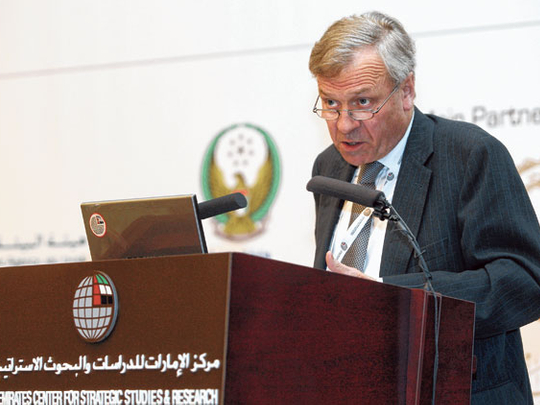
Abu Dhabi: The West seeks to see active Arab participation in the enforcement of UN Security Council resolutions on Libya, former Nato chief told a regional security conference in Abu Dhabi yesterday.
Stressing that the Arab opinion prevailed as the United States and its allies did not go ahead with the ongoing military action against Libya without the support of other Arab countries, Jaap de Hoop Scheffer, former Secretary-General of the North Atlantic Treaty Organisation (Nato), said the adoption of UN Security Council Resolution 1973 on Libya is an important moment in the relationship between the United States, Europe and the Arab world.
"We saw the GCC and Arab League give political coverage to military action in an Arab state, and the United States and its allies did not want to act without their support. Active Arab participation in the enforcement of this resolution should follow."
Scheffer argued it is particularly important for the political relationship between this region and the West that the GCC nations show military support as well as political support.
"We should use this moment to intensify the political dialogue between Nato, the EU and the GCC."
Iran's influence
While understanding the concerns the UAE and GCC have about Iran's influence in the region's geo-strategic balance, Scheffer said he hoped "in Bahrain a just and non-violent solution will be found so that all Bahraini citizens will be loyal to their own nation and not become pawns in another nation's agenda."
Addressing the conference "Global Strategic Development: A Futuristic Vision", organised by the Emirates Centre for Strategic Studies and Research, the former Nato chief said the UAE has proved its willingness to be a provider of security far beyond its region.
"If there ever was a moment when Nato and its Gulf partners should seize the momentum, it is now. Two appropriate areas for greater cooperation are maritime security and joint military training."
He suggested a military alliance cannot be successful without a firm political foundation. In the 21st century world, collective security is much more than military security. Members of an alliance need continuous political dialogue.
Nato is a political-military alliance based on shared values, and the allies have always shared a consensus on where and when to act. In Afghanistan, for instance, there was a consensus that the alliance was acting on one of the front lines of international terrorism.
Scheffer said the EU is a successful but unfinished alliance. In the financial and economic domain, the EU is one of the most important world players. But in the areas of foreign policy and defence, the union lacks the necessary cohesion and credibility. The bigger EU nations cannot resist the temptation to act independently. The political will to make the EU a serious defence or foreign policy actor is lacking, but the EU should take more responsibility for security and defence matters.
"We are witnessing the rise of new and powerful nations. The multilateral system is in flux because of the atrophy of the UN and the Security Council. As long as the Security Council reflects the political power structure of 1945, its legitimacy and credibility will be questioned."












